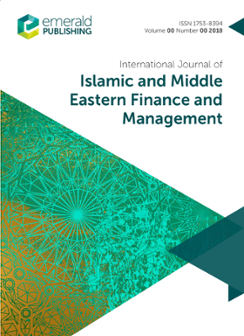International Journal of Islamic and Middle Eastern Finance and Management
Issue(s) available: 74 – From Volume: 1 Issue: 1, to Volume: 17 Issue: 3

Volume 15
Volume 12
Volume 6
Volume 3
Work ethic, cultural impact and perceived performance – innovative insights from three countries
Marija Runić-Ristić, Tijana Savić Tot, Nikolina Ljepava, Vilmoš TotThis study aims to examine the relationship between work ethics and organizational performance and investigate the influence of respondents’ career stages on their work ethic…
Exploring IFRS in Islamic finance: a bibliometric and coding analysis of emerging topics and perspectives
Davide Calandra, Federico Lanzalonga, Paolo Pietro BianconeEmerging economies are increasingly benefiting from Islamic finance principles. The distinctive features of this unconventional form of finance are starting to be considered even…
Security tokens, ecosystems and financial inclusion: Islamic perspectives
Habib AhmedShariah-compliant security tokens can play an important role in developing innovative solutions to resolve voluntary and involuntary financial exclusion in Muslim societies. This…
Pricing risk contribution of general Takaful by spatial generalized linear mixed models at the level of tariff cells
Reza Hajipour Farsangi, Ghadir Mahdavi, Majid Jafari Khaledi, Murat Büyükyazıcı, Mitra GhanbarzadehThis study aims to price the risk contribution of general Takaful at the level of tariff cells, considering a spatial dependency framework.
How do stock markets react to dividend announcements during the COVID-19 pandemic? Evidence from the GCC markets
Jamal Ali Al-Khasawneh, Heba Ali, Ahmed HassaneinThis study aims to investigate how stock markets responded to corporate dividend policy changes during the COVID-19 pandemic in the Gulf Cooperation Council (GCC) countries…
Volatility spillover and dynamic correlation between Islamic, conventional, cryptocurrency and precious metal markets during the immediate outbreak of COVID-19 pandemic
Muhammad Mahmudul Karim, Abu Hanifa Md. Noman, M. Kabir Hassan, Asif Khan, Najmul Haque KawsarThis paper aims to investigate the immediate effect of the outbreak of the COVID-19 pandemic by investigating volatility transmission and dynamic correlation between stock…
Creating a religious identity and impression management by Islamic banks
Bassam Mohammad Maali, M. Kabir Hassan, Mamunur RashidIslamic banks (IBs) place significant importance on their religious identity, prompting the utilization of impression management (IM) strategies to emphasize such identity. This…
Islamic microfinance services: a catalyst for poverty reduction in eastern Ethiopia
Anwar Adem Shikur, Erhan AkkasThis study aims to examine the influence of Islamic microfinance services (IMFS) on poverty reduction in the eastern part of Ethiopia.
Capital structure and earnings management: evidence from Saudi Arabia
Abdullah AlsaadiThis study aims to examine how capital structure influences earnings management for firms in the Saudi market, which is influenced by an Islamic environment that discourages…
Impact of banking subsystem liquidity creation on real economic output
Mohammed Mahmoud Mantai, Izlin Ismail, Obiyathulla Ismath BachaThis study aims to examine the impact of liquidity creation per capita of tri-banking system and dual banking system on real economic output.
Examining preference shares from the Shari’ah perspective: a systematic literature review
Wafa Mohammed Ali Nasr, Aznan HasanThis paper focuses on the different Shari’ah resolutions on preference shares. This study aims to provide a systematic review to cover all authentic, peer-reviewed literature on…
Sand or grease effect? The impact of Islamic banking on the social mission of microfinance institutions
Md Imran Hossain, Adamu Jibir, Md Aslam Mia, Musa Abdu, Swati ChauhanIslamic banking and microfinance institutions (MFIs) share the core objective of serving the underprivileged. This study aims to investigate whether Islamic banking development…
Whistleblowing likelihood scale in the lights of Kohlberg and Maqasid Shariah
Hamdy Abdullah, Fahru Azwa Mohd Zain, Sheikh Ahmad Faiz Sheikh Ahmad Tajuddin, Nurul Aisyah Awanis A Rahim, Hazrin Izwan Che Haron, Muhammad Takiyuddin Abdul GhaniThe purpose of this study is to develop a new whistleblowing scale considering the conventional and Islamic perspectives in combating corruption. Whistleblowing has received great…
ISSN:
1753-8394Online date, start – end:
2008Copyright Holder:
Emerald Publishing LimitedOpen Access:
hybridEditor:
- Prof M. Kabir Hassan
